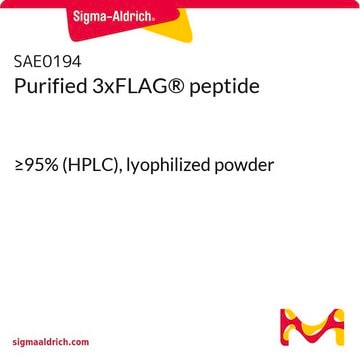FLAGIPT1
FLAG® Immunoprecipitation Kit
Synonyme(s) :
Anti-ddddk, Anti-dykddddk
Se connecterpour consulter vos tarifs contractuels et ceux de votre entreprise/organisme
About This Item
Code UNSPSC :
12352200
Nomenclature NACRES :
NA.32
Produits recommandés
Utilisation
kit sufficient for 50 reactions
Niveau de qualité
Classe(s) chimique(s) de l'analyte
proteins (FLAG® Affinity Gels)
Technique(s)
immunoprecipitation (IP): suitable
Conditions d'expédition
wet ice
Température de stockage
−20°C
Description générale
Sigma′s FLAG Immunoprecipitation kit allows a rapid and efficient immunoprecipitation and elution of an active FLAG-tagged protein. The immunoprecipitation is performed with the ANTI-FLAG M2 affinity gel, which is a highly specific monoclonal antibody covalently attached to agarose resin. The use of affinity resin allows an efficient binding of FLAG-tagged proteins without the need for preliminary steps and calibrations. The immunoprecipitated FLAG-tagged proteins can be efficiently eluted from the resin with acidic conditions or by competition with FLAG peptide. The immunoprecipitated proteins can be detected for their size, post-translational modifications, and interactions on gel electrophoresis, and by activity assays.
Application
Learn more product details in our FLAG® application portal.
Caractéristiques et avantages
- Utilizes highly specific ANTI-FLAG M2 affinity gel
- No preliminary steps or calibrations
- 3X FLAG™ peptide provides efficient and gentle elution through direct competition
Autres remarques
All prodedures to be performed at 2-8°C.
Informations légales
3xFLAG is a trademark of Sigma-Aldrich Co. LLC
FLAG is a registered trademark of Merck KGaA, Darmstadt, Germany
Produit(s) apparenté(s)
Réf. du produit
Description
Tarif
Mention d'avertissement
Warning
Mentions de danger
Conseils de prudence
Classification des risques
Aquatic Chronic 3 - Eye Irrit. 2
Code de la classe de stockage
10 - Combustible liquids
Certificats d'analyse (COA)
Recherchez un Certificats d'analyse (COA) en saisissant le numéro de lot du produit. Les numéros de lot figurent sur l'étiquette du produit après les mots "Lot" ou "Batch".
Déjà en possession de ce produit ?
Retrouvez la documentation relative aux produits que vous avez récemment achetés dans la Bibliothèque de documents.
Les clients ont également consulté
Mercedes Rodriguez-Teja et al.
Molecular cancer research : MCR, 13(3), 538-547 (2014-11-09)
Epithelial cell-cell contacts maintain normal glandular tissue homeostasis, and their breakage can trigger epithelial-to-mesenchymal transition (EMT), a fundamental step in the development of metastatic cancer. Despite the ability of C-type lectin domains (CTLD) to modulate cell-cell adhesion, it is not
Konstantinos Koudounas et al.
Plant physiology, 174(3), 1371-1383 (2017-05-10)
Oleuropein, a terpene-derived glycosylated secoiridoid biosynthesized exclusively by members of the Oleaceae family, is involved in a two-component defense system comprising a β-glucosidase that activates oleuropein into a toxic glutaraldehyde-like structure. Oleuropein and its deglycosylated derivatives have high pharmaceutical interest.
Kuancan Liu et al.
Molecular therapy : the journal of the American Society of Gene Therapy, 28(3), 901-913 (2020-01-29)
Esophageal squamous cell carcinoma (ESCC) is a predominant cancer type in developing countries such as China, where ESCC accounts for approximately 90% of esophageal malignancies. Lacking effective and targeted therapy contributes to the poor 5-year survival rate. Recent studies showed
Samer Swedan et al.
Journal of virology, 85(19), 10090-10100 (2011-07-29)
Human respiratory syncytial virus (RSV), a major cause of severe respiratory diseases, efficiently suppresses cellular innate immunity, represented by type I interferon (IFN), using its two unique nonstructural proteins, NS1 and NS2. In a search for their mechanism, NS1 was
Mateusz Wydro et al.
Nucleic acids research, 38(11), 3732-3742 (2010-02-11)
Mammalian mitochondria contain their own genome that is almost fully transcribed from both strands, generating polycistronic RNA units that are processed and matured. The mitochondrial mRNA is modified by oligo- or polyadenylation at the 3' termini, but the exact function
Notre équipe de scientifiques dispose d'une expérience dans tous les secteurs de la recherche, notamment en sciences de la vie, science des matériaux, synthèse chimique, chromatographie, analyse et dans de nombreux autres domaines..
Contacter notre Service technique













